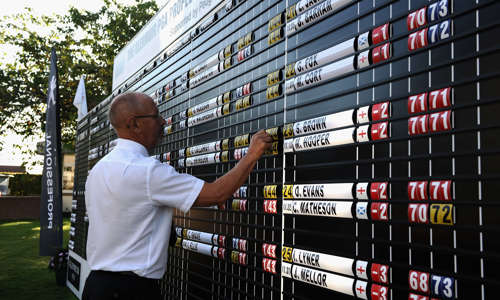COVID-19 Unincorporated Association scenarios for UK Golf Clubs
COVID-19 Unincorporated Association scenarios for UK Golf Clubs
The PGA have created various scenarios to provide guidance on business support available to UK based golf clubs.
Background
The Professional Golfers’ Association is aware that Golf Clubs operate under a variety of business models.
Almost every Golf Club is currently affected by business interruption due to the COVID-19 emergency, while government advice and support is evolving almost daily.
Against this background, the Association is keen to provide some clarity to Golf Clubs on what government support is currently available under a number of scenarios, depending on how their individual businesses are constituted, and how this support might be accessed. This information is for guidance only. It is not intended to be prescriptive and legal and accounting/tax advice should be sought where appropriate.
Types of business model
The key business situations under consideration are:
- Unincorporated Associations
- Limited companies
Many Golf Clubs, whether members clubs or proprietary clubs, will be constituted under these models and will operate as businesses subject to Corporation Tax, VAT, PAYE and business rates as appropriate to their operations.
UNINCORPORATED ASSOCIATIONS
Definition
An unincorporated association is an organisation set up through an agreement between a group of people who come together for a reason other than to make a profit (for example, a voluntary group or sports club).
Unincorporated associations do not have a legal identity which is separate from that of its members. This means that an unincorporated association cannot enter into contracts in its own name; contracts must be entered into by all of the association’s members, or such other people referred to in its constitution or rules, such as its office bearers or management.
If the association makes a profit it is subject to Corporation Tax the same as a limited company.
The taxable person for VAT purposes is the sum of the members of the association collectively. Unincorporated associations fall within section 46(3) of the VAT Act 1994 and they should be registered in the name of the association.
Ultimately, individual members of an unincorporated association are personally responsible for any debts and contractual obligations.
Scenario - Denbury Golf Club
Denbury Golf Club in Northern Ireland, which is an unincorporated association, had been operating in a loss-making situation before the COVID-19 pandemic and which may need a financial overhaul to achieve survival.
The Club, which is 108 years old, operates as an unincorporated association. It is located not far from Coleraine and has a tidy heathland course with 18 holes. The Club, like many others, has suffered in recent years from falling membership numbers, rising costs and low visitor footfall and, because of its location, it is largely dependent on attracting its membership from the local area.
The Club employs a Secretary who undertakes the administration work, three greenkeepers, three bar staff, four catering and waiting staff and a cleaner, a total of 12 employees on the payroll. Their PGA Professional has been retained at the Club for the last three years and provides the full range of golf services to members and visitors, but the lack of practice and coaching facilities hamper him providing the quality of service he would like to deliver.
The business of the Golf Club is directed by a volunteer committee of 10 members, and it is becoming more and more difficult to attract members to serve on it. The Club Captain leads the committee, but the captaincy is for only one year, leading to a short term and constantly changing approach to running the club.
Membership numbers have fallen from over 400 in 2017 to just under 300 in 2020, and the Club has made losses of £20,000, £16,000 and £23,000 in its last three financial years. Consequently, successive committees have had to approach the membership for increased subscriptions in each of the last three years, contributing significantly to the fall in membership numbers.
With no defined strategic direction, the Club has not managed to balance the books for some time and consequently has no reserves set aside to help it through times of unanticipated business interruption, such as the recent closing down of golf throughout the United Kingdom and the Republic of Ireland because of the COVID-19 pandemic.
Following closure of Golf Clubs, the Committee’s immediate concern was the Club’s employment costs at a time when no income was being generated. Committee members became aware of the Coronavirus Job Retention Scheme, where businesses can apply to HMRC for reimbursement of up to 80% of furloughed workers’ salary costs, up to a cap of £2,500 net per month for the 4 months to June 30, 2020. On 12 May, the scheme was extended to the end of October 2020 with no changes to it anticipated until the end of July.
The Committee needed to decide how much of the workforce to designate as affected employees and consequently temporarily furlough them with the financial aid of the scheme. Given the financial situation the Club finds itself in, there is little option but to furlough all staff except for the Secretary who will continue to provide administration support albeit working from home, and two of the greenkeeping staff, who are being retained to undertake essential maintenance on the course.
Businesses are encouraged to top up the salaries of furloughed employees to 100%, but again because of the Club’s financial situation, this was considered unsustainable throughout closure. The decisions have been communicated to the staff and they are content that their jobs are at least secure during the crisis.
When the portal for the Coronavirus Job Retention Scheme opened, the Secretary logged into the Government Gateway, provided the details of the employees being furloughed, the duration of the furloughs and the amount of the claim, and payment is expected within 6 working days from the information being submitted.
The PGA Professional’s business has completely dried up as a result of the lockdown and there are no retail or coaching opportunities at a time when turnover usually represents 35% to 40% of his annual income. As a sole trader, he has successfully applied for support through the Self Employed Income Support Scheme which will provide some level of income throughout the period of closure. The Government portal for applications under this scheme is due to open on May 13.
Point of Information – had the PGA Professional been trading as a limited company and was on the payroll as an employee, he would have been able to apply for support under the terms of the Coronavirus Job Retention Scheme. If he took his income only through dividends, he would not have been eligible for support through either scheme.
Now that the workforce has been considered, the Committee is looking into what business support is available to help ease short term cash flow issues. The Bounce Back Loan Scheme offering government backed loans to help small businesses through the COVID-19 outbreak, might be a useful option, with favourable interest rates and repayment terms. The Bounce Back Loan Scheme is available for small and medium sized businesses to borrow between £2,000 and £50,000, up to 25% of turnover, at an interest rate of 2.5% after the first year of the loan, which is interest free. The loans are repayable over six years, and there are no charges for early repayment.
The Committee believes that The Club may need to borrow up to £10,000 to see it through the pandemic, which would sustain cash flow in the short to medium term. The intention is therefore to apply for a Bounce Back Loan for that amount, and it is believed that the Club meets the eligibility criteria. Efforts will of course be made to replay the loan before the end of the 0% interest rate period.
The Committee has also become aware of the Retail, Hospitality, Tourism and Leisure Grant, a cash grant of £25,000 for businesses operating a premises in the retail, hospitality, tourism and leisure sectors, and is of the view that the Club might be eligible since its Total Net Annual Value (“NAV”) – the basis on which Business Rates liabilities are assessed in Northern Ireland - falls between the eligible values of £15,000 and £51,000. The Secretary applied for the grant online ahead of the closing date of May 20, 2020.
Point of Information - Had the Club been based in England, Scotland or Wales, the Retail, Hospitality and Leisure Grant would have been dependent on different rateable values:
- England - £25,000 grant is applicable on rateable values of £15,000 - £51,000, and £10,000 Small Business Grant is eligible for rateable values of up to £15,000.
- Scotland - £25,000 grant is applicable on rateable values of £18,000 - £51,000, with the Small Business Grant for rateable values of £18,000 or less.
- Wales- £25,000 grant is applicable on rateable values of £12,000 - £51,000, with a £10,000 grant for rateable values under £12,000.
The Club has automatically had the Business Rates Relief applied to its rates bill which, in Northern Ireland takes the form of a three month rates holiday for non-domestic ratepayers. This has therefore had a positive impact on The Club’s immediate cash flow throughout April and will continue to do so throughout May and June 2020.
Point of information - Had the club been based in England, Scotland or Wales, the rates holiday for retail, hospitality and leisure businesses would have been applicable for a full 12 months. To be eligible in Wales, the rateable value must be below £500,000.
The Club is registered for VAT and is therefore looking to take advantage of a VAT payment deferral, allowing payments due between March 20 and June 30 2020 to be deferred until March 31 2021. The Committee considers that it has no choice but to defer the payment to ease short term cash flow difficulties The Secretary has cancelled the VAT direct debit but has filed the VAT return covering January to March 2020, due May 7, on time as required. Arrangements for a deferral of PAYE payments are also considered on a case-by-case basis dependant on the individual circumstances. Currently this is being considered for businesses affected by COVID-19 and the Secretary has contacted HMRC to discuss an initial deferral.
In summary, the Club has taken advantage of the Coronavirus Job Retention Scheme to support the continued employment of staff. It may also be eligible for a Retail, Hospitality, Tourism and Leisure Grant and an application has been submitted. It is in the process of applying for a Bounce Back Loan, while its Business Rates holiday has been automatically applied for a 3 month period. The VAT payment for the quarter ended 31 March has been deferred until 31 March 2021, and the Committee is hopeful of arranging a PAYE payment deferral relating to months March, April and May, but remain aware these obligations will need to be met in the future.
The PGA Professional, as a sole trader, has been able to take advantage of the Self Employed Income Support Scheme and will process his application when the portal opens on 13 May.
The Club is keeping updated on when golf may be allowed to reopen and is hopeful that the Government support available will offer sustainability throughout this period.
Discussions with the PGA Professional have indicated that he is willing to work with the Committee to recommence services when golf restarts in Northern Ireland, subject of course to the appropriate safeguarding measures being in place. He will continue to communicate with the Committee in the lead up to golf restarting.
With golf courses reopening in The Republic of Ireland on May 18, and recent announcements that is will restart in England on May 13 and Wales on May 18, the Committee is hopeful that it won’t be long before the courses in Northern Ireland will also become active again. As a result, the Committee has started to plan for when golf can restart. The Committee members recognise the clubhouse will be the last to open and therefore bar, catering and waiting staff will continue to be furloughed for the immediate future. The furloughed greenkeeper will return as soon as the green light is given for courses to open, so that the course can be prepared for the members.
The Committee is acutely aware of the importance of its already declining membership during the recovery, and plans are under way to prioritise on members having access to the course at the expense of visiting golfers, to meet their expectations and provide the best value for money for their membership. This has already been communicated to members, who have also been made aware of the likely safeguarding requirements when golf is able to restart.
In conclusion, the Committee of Denbury Golf Club has taken reasonable steps to access what Government support, deferrals and loans as might be available to mitigate the impact of the COVID-19 pandemic on its financial position and operational activities. It will, however, need to carefully manage its position as golf restarts in Northern Ireland to secure its future, particularly given its loss-making performance in recent years and the absence of financial reserves to support the Club through unforeseen business interruptions such as the one experienced since March.



































